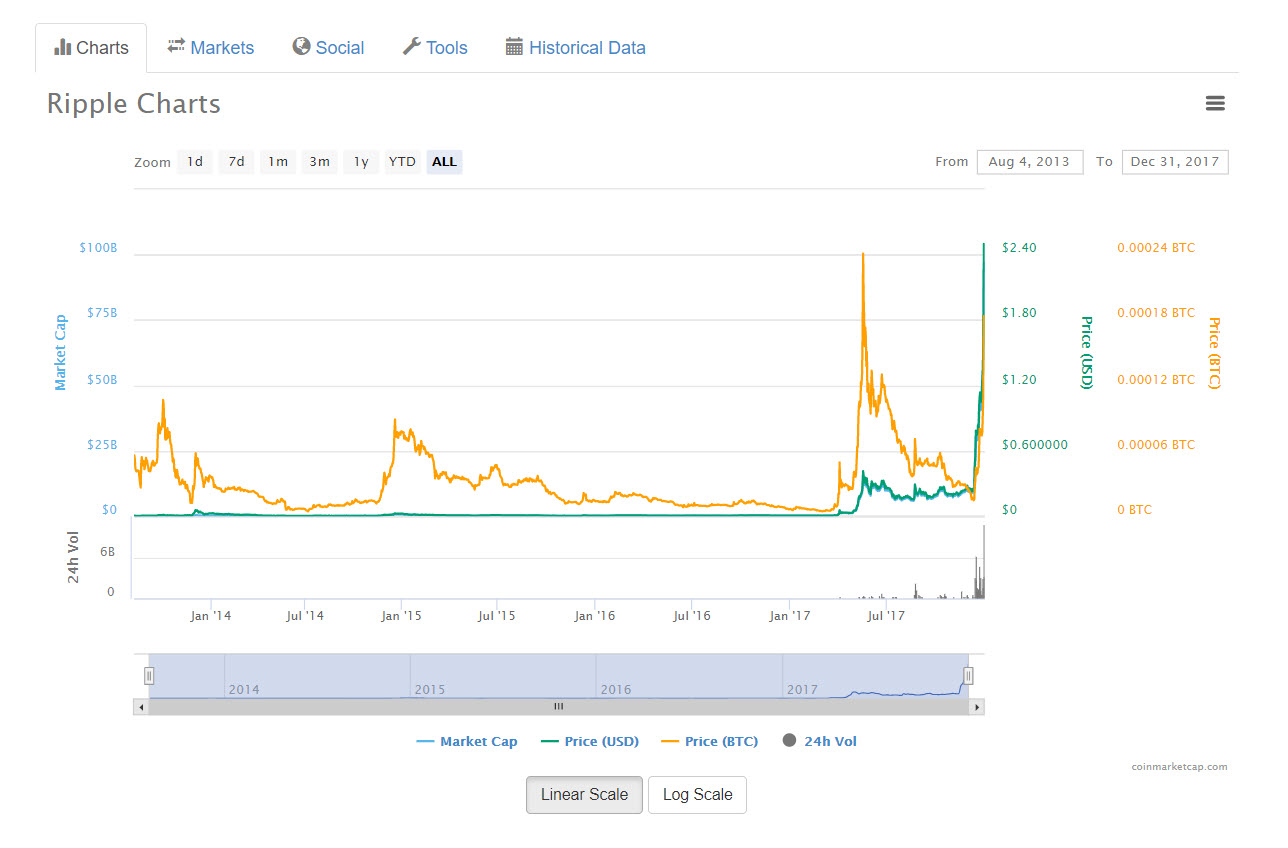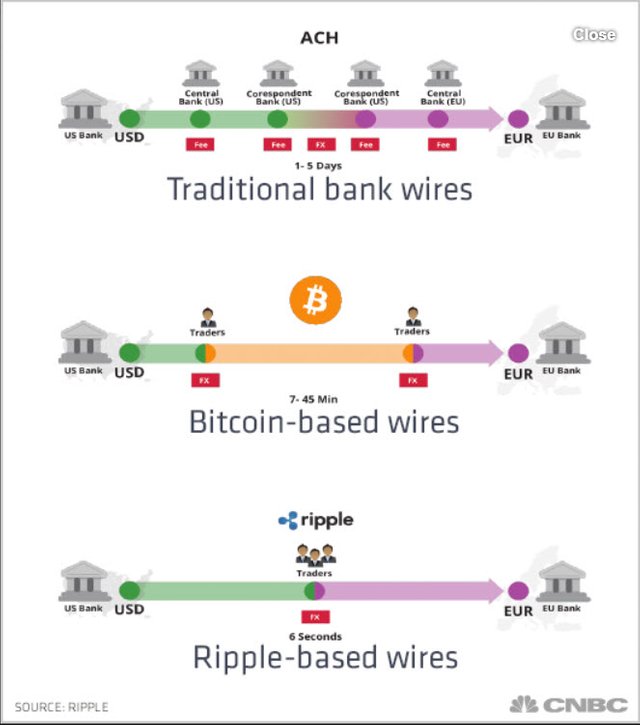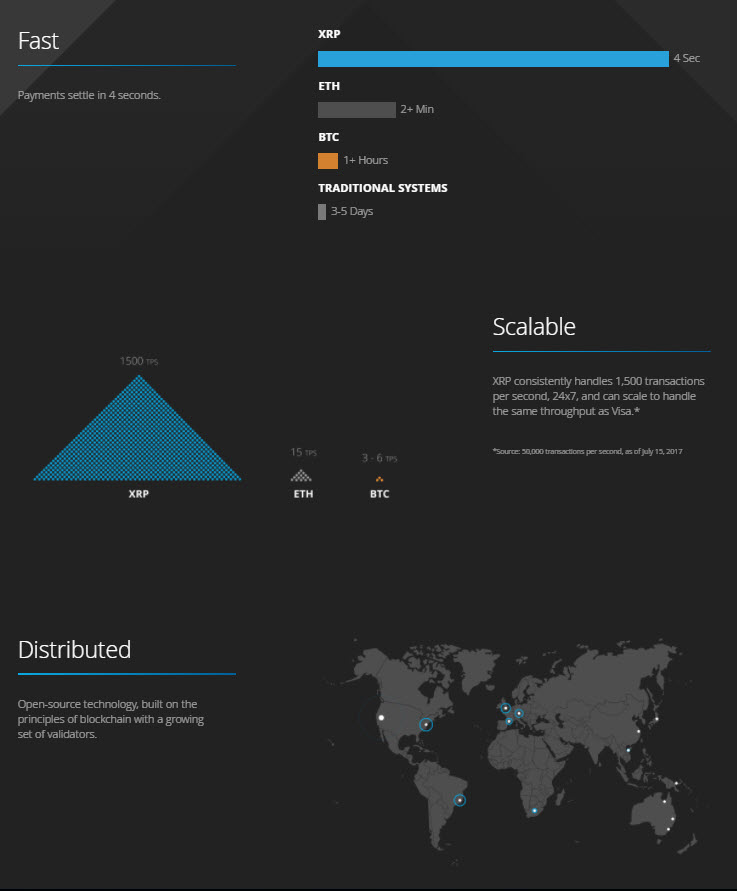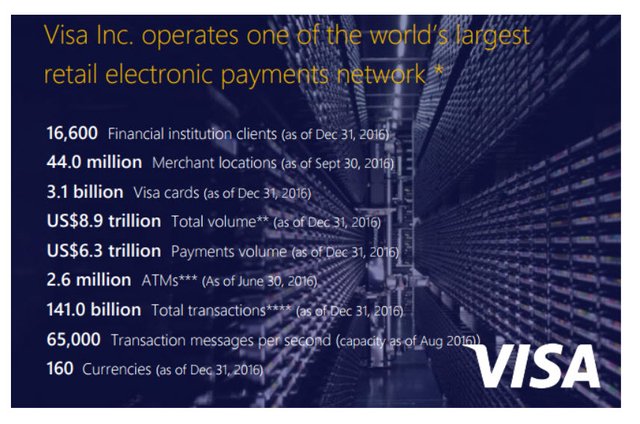What is Ripple ?
Ripple Components
Ripple is a payment network for banks and financial institutions that allows them to send and receive currency and settle transactions more quickly and more cheaply than their existing back-end systems.
There are three parts to Ripple:
- Ripple Labs, the San Francisco-based parent company (originally called Opencoin), which has raised nearly $100 million in funding and is led by CEO Brad Garlinghouse.
- RippleNet, the payment network, described above and now used by major partners like American Express.
- XRP the token of the Ripple network. Ripple network need XRP in order to function.
XRP History Price Chart
What you normal see on https://coinmarketcap.com/currencies/ripple/ is XRP price by time. XRP already have a huge 2017 year. At the beginning of 2017, one XRP was .01 cents, or one hundredth of one cent. At the end of December, one XRP is more than 2 dollar. Mean it up more than 20,000% in 2017. It is really impressive.

For more about how XRP compare with Bitcoin and Ethereum, please go to https://ripple.com/xrp/
How Ripple Work ?

Ripple vision is for value to be exchanged as quickly as information. Although information moves around the world instantly, a single payment from one country to another is slow, expensive and unreliable. In the US, a typical international payment takes 3-5 days to settle, has an error rate of at least 5% and an average cost of 42 USD. Worldwide, there are 180 trillion USD worth of cross-border payments made every year, with a combined cost of more than USD1.7 trillion a year. This is a huge number.
With the Internet of Value, a value transaction such as a foreign currency payment, can happen instantly, just as how people have been sharing words, images and videos online for decades. And it’s not just money. The Internet of Value will enable the exchange of any asset that is of value to someone, including stocks, votes, frequent flyer points, securities, intellectual property, music, scientific discoveries, and more.
Why Invest to Ripple ?
- Ripple solve the real, concreate problem. And it is really really huge problem. It reduce time and cost to do transfer money cross border.

Big boy joined Ripple, and it usage proofed in reality.
- Forty Seven Japanese Banks Move Towards Commercial Phase Using Ripple
- US Federal Reserve test and approve Ripple
- Top Korean banks work with Japan bank consortium to modernize cross border payments
- American Express, Santander team up with Ripple for cross-border payments via blockchain
The opportunity is very huge. If Ripple only integrated with just Visa.

How to Buy and Sell XRP (Ripple Coin)?
Currently , Bitstamp support for buy directly XRP from USD. So bellow 4 steps are good to buy XRP
- Create account in Bitstamp
- Verify your personal account (this process will take from 2 to 5 days)
- Deposit USD to your account
- Buy XRP
Ripple Long-Term Invest Strategy
Make sure you do your own research. Do not invest on what you do not understand as Warren Buffett said.
Only go long, do not try to beat market at short. Why need to shell Ripple if more and more bank joining the network. Try to see how many percent of increate if you hold XRP for 1 year ?
Ready for every thing could happen.
When you will buy or sell one investment.
Compare Ripple vs Bitcoin
Difference #1: Mining process
Bitcoins are created through mining by the users. Ripple creators have already created 100 billion Ripples for the release. Out of these 100 billion Ripples, 55 billion will be distributed to charitable organizations, users, and strategic partners.
Difference #2: Transaction speed
The Bitcoin Blockchain is requiring mining process. That is why Bitcoin transactions are usually taking longer to authorize than those of Ripple. In fact, Ripple transactions take just 4 seconds to authorize. Thus, Ripple transaction speed is faster than Bitcoin.
Difference #3: De/centralized exchange
In order to buy/sell Bitcoins, one has to utilize the centralized exchange, which can potentially crash. With Ripple, you can buy or sell XRP on its own secure network.
Difference #4: Transaction fee
Bear in mind, that each Ripple transaction has a fee, which is eventually being destroyed. Thos implies that the fee is not paid to anyone. Bitcoin, on the other hand, normally does not have any transaction fees.
Difference #5: Information tracking
Ripple is able to track information of any kind, such as account balance. On the contrary, Bitcoin network only tracks the movement of Bitcoins.
What Next ?
Some place you could find out more information about Ripple from people really invested in Ripple.
https://www.reddit.com/r/Ripple/